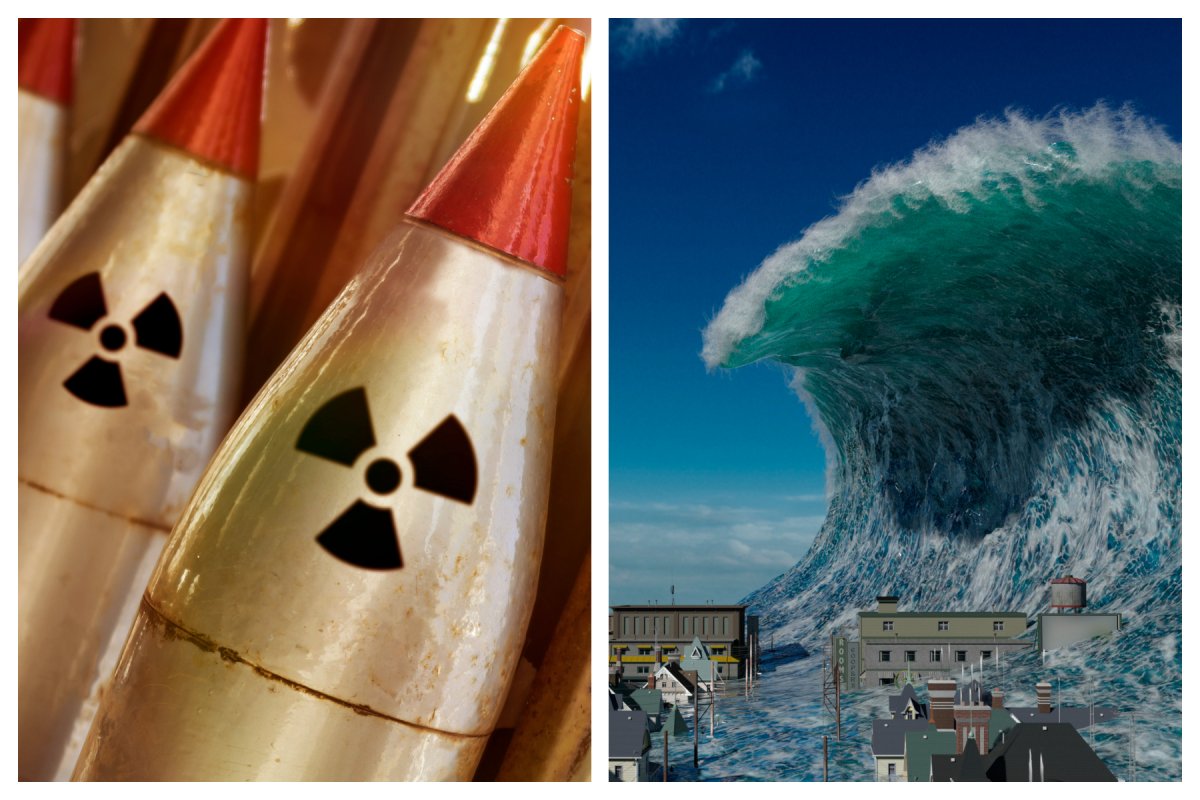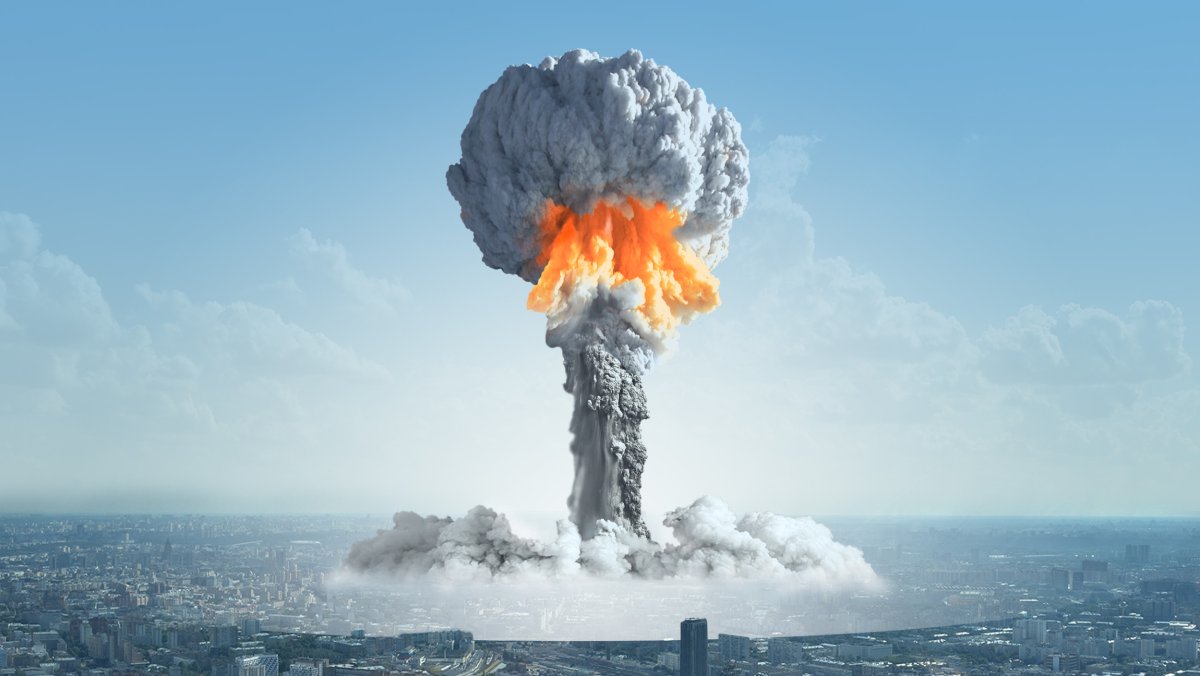Russia has made its first batch of nuclear-capable torpedoes that are said to be so powerful they could cause radioactive ocean swells and huge nuclear tsunamis that could destroy coastal cities in the U.S. or its allies.
The Poseidon torpedoes are due to be delivered to the special-purpose nuclear-powered submarine Belgorod, reported Russian state news agency TASS on Monday.
A pro-Vladimir Putin TV host, Dmitry Kiselyov, said in May last year that these torpedoes would be capable of causing a 500-meter [1,640 feet] high tidal wave of radioactive seawater, and that they could "plunge Britain into the depths of the sea".
If Poseidon can indeed trigger enormous radioactive tsunamis, the torpedoes could have a huge impact on marine life, as well as human life.

"There is no nuclear weapon technology that doesn't pose a risk to human and ecological health," Danielle Endres, an environmental communication professor at the University of Utah, told Newsweek.
"In terms of the impacts of nuclear weapons in the ocean, the U.S. actually did a series of nuclear tests at Bikini Atoll, some of which were underwater tests. For example, the Baker test in 1946 involved exploding a nuclear bomb beneath the water surface in a lagoon that created a huge crater in the reef that destroyed ecological life and resulted in a tsunami that either sunk or contaminated the test ships in the vicinity."
And another nuclear threat to the UK from Russian state TV's Dmitry Kiselyov:
— Francis Scarr (@francis_scarr) May 1, 2022
He says his country's Poseidon nuclear underwater drone could cause a tsunami that would "plunge the British Isles into the depths of the sea" and turn them into a "radioactive desert" (with subs) pic.twitter.com/usElgqHeIG
"Of course, the Poseidon torpedo is not the same as the bomb in the Baker test, so we can't say that the consequences would be the same. But we know from our own government's testing of nuclear weapons underground that there can be major consequences for marine and human life. Collectively, the nuclear tests conducted in and around Bikini Atoll have had long term health and environmental impacts."
Radioactive fallout has been previously found to have a big impact on wildlife in the vicinity. In the aftermath of the Chernobyl nuclear disaster, birds and mammals were found to have developed cataracts in their eyes and smaller brains. Additionally, many birds had malformed sperm, with nearly 40 percent of male birds being completely sterile in the most radioactive areas.
The blast of the bomb would also have major effects on ecosystems: seabed invertebrates have been found to be significantly disturbed by natural tsunamis, while on land, tsunamis uproot trees, destroy bird nesting sites, cause land animals to drown, and wash pollution back into the sea that may poison a range of marine life.
Poseidon, if it is ever deployed, would likely be less destructive to human life than a land-based nuclear bomb, however, due to the differences between the atmosphere and the ocean in terms of fallout. Poseidon can also be fitted with a conventional warhead, according to a Congressional Research Service report from last year, which said the system may not be deployed until 2027.

"While a 'Nuclear Ocean Swell' sounds plenty horrifying, it would be distinct from an on-land detonation in that there would be no fire storms to loft soot into the stratosphere and thus no climate impact," Tyler Rohr, a chemical oceanographer and biogeochemical modeller at the University of Tasmania in Australia, told Newsweek.
"Note, the reason there was no 'nuclear winter' following the myriad bomb-tests conducted by the U.S. and Russia during mid-century was because they were all detonated above the desert or ocean, intentionally away from cities which could burn."
"[Poseidon] wouldn't have the same global reach as a large-scale conflict in cities, unless of course it triggered a larger geo-political conflict fought on land."
The yield of Poseidon may be up to 100 megatons, Shaun Burnie, a senior nuclear specialist at Greenpeace, told Newsweek in 2022. This figure—about seven thousand times more than the nuclear bomb dropped on Hiroshima—matches that given by Russian TV anchor Kiselyov. However, other experts disagree with this figure: "[That's] simply insane—that would be the biggest warhead ever deployed", David Hambling, a technology journalist specializing in defence, told EuroNews.next.
"I mean, with the current Russian regime, who knows? It's possible that they might have the hubris to build something like that, but it certainly is grotesquely gigantic," he said.
The tsunami threats may not even come to fruition if Poseidon were used, as the enormous amounts of energy actually required to trigger a tsunami may not be achieved by the nuclear torpedoes.
"We know that from quite a lot of work which was actually done again back in the crazy days of the Cold War about doing this very thing, and creating tsunamis with nuclear weapons," Hambling said.
"It turns out you need a vast amount of energy to do that—even more than you can get out of a nuclear blast. If it's moved into a harbor and detonated very close offshore, it would certainly be able to destroy a city. But it probably wouldn't damage much beyond that, and it certainly wouldn't do as much damage as a large nuclear airburst."
Russia has produced the first set of Poseidon nuclear-capable super torpedoes. It was produced for use by the Belgorod special-purpose nuclear submarine.
— Fuad Alakbarov (@DrAlakbarov) January 16, 2023
(TASS) pic.twitter.com/a6C1cxsnyM
Poseidon torpedoes were said to be meant only as retaliatory weapons, designed to hit back after a nuclear strike on Russia, according to a U.S. Congressional Research Service (CRS) report last March.
The torpedoes themselves are thought to be around 65 feet long, have a range of about 6,200 miles, and a top speed of 50 nautical mph, Sidharth Kaushal, a research fellow for sea power and missile defense at British defence think tank RUSI, told Euronews.next in May 2022.
The Belgorod, the submarine that the new batch of Poseidon torpedoes is reported to be destined for, may be only the first in a fleet of four submarines that could carry the weapons. Testing of components including the nuclear power unit had been successfully completed, an anonymous source reportedly told TASS.
Do you have a tip on a science story that Newsweek should be covering? Do you have a question about nuclear tsunamis? Let us know via science@newsweek.com.
Uncommon Knowledge
Newsweek is committed to challenging conventional wisdom and finding connections in the search for common ground.
Newsweek is committed to challenging conventional wisdom and finding connections in the search for common ground.
About the writer
Jess Thomson is a Newsweek Science Reporter based in London UK. Her focus is reporting on science, technology and healthcare. ... Read more
To read how Newsweek uses AI as a newsroom tool, Click here.








